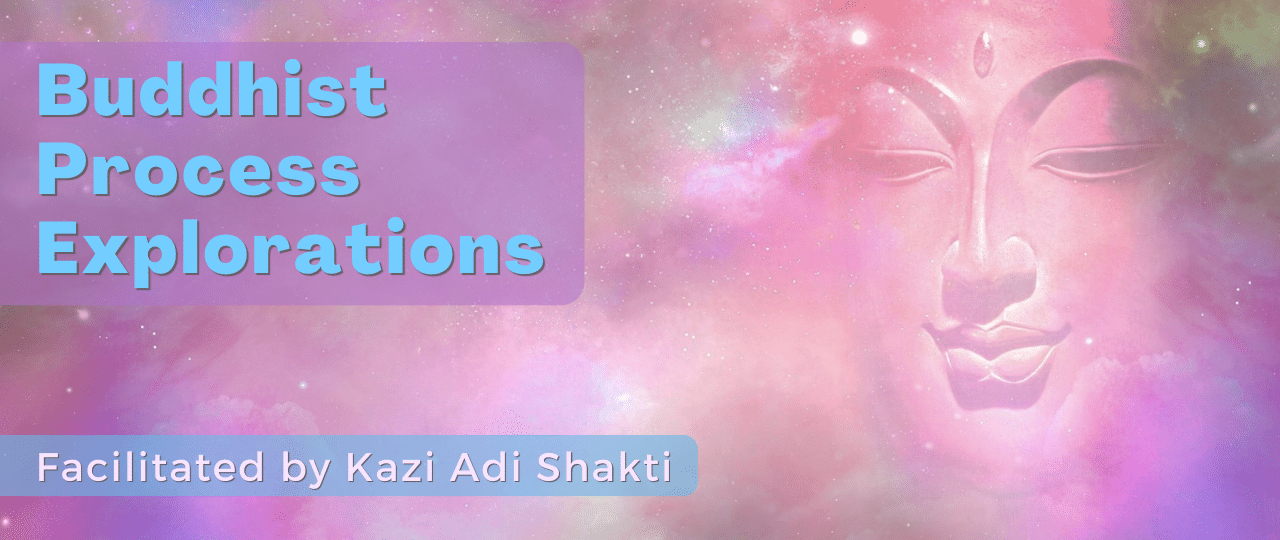Buddhist Process Explorations

A Discussion Group About the Exploring, Sharing,
and Practice of Buddhist Process-Relational Thought
| WHAT? | Learning Circle |
| WHEN? | Monthly on the third Wednesday at 5:00 PM Pacific / 8:00 PM Eastern Meetings will resume on March 19, 2025 |
| WHERE? | Online Via Zoom |
At face value, the Buddha’s Dharma and Whitehead’s Process Philosophy seem to characterize reality in very different ways, and for different reasons. The Buddha taught that reality as we typically experience it is an impermanent, selfless and dissatisfying process of cyclic becoming continuously powered by compulsive attachment and aversion grounded in delusion. The Buddha prescribed various methods we could deploy in order to go beyond this painful and immiserated condition, methods which involve thorough analysis and deconstruction of our habituated and self-limiting assumptions about ourselves and the world as well as means of cultivating more purified states of awareness and embodiment so that we can awaken to the way things really are and unleash our core potential.
Whitehead elaborated a systematic philosophical scheme, replete with foundational metaphysical categories, that reconstructs reality as a cumulative process of concrescence whereby many diverse feelings creatively synthesize into a novel experience, aiming towards satisfaction and lured to completion through divine persuasion. For Whitehead, many of the issues in philosophy and society at large could be traced to various fallacious conceptions concerning nature, language, and experience which he sought to rectify with his panexperiential, process-relational Philosophy of Organism.
“In the inescapable flux, there is something that abides;
in the overwhelming permanence, there is an element that escapes into flux….
Those who would disjoin the two elements can find no interpretation of patent facts.”
–A.N. Whitehead, Process and Reality, 5.1.2.
In spite of their differences, both traditions characterize reality as an unceasing process of becoming devoid of independent, self-sufficient, and static entities, and both traditions give great emphasis to aesthesis or direct, unmediated experience as the beginning and end of all analysis and speculation. Concomitantly each tradition has also been ethically oriented to openness and interdependence, putting great value on both the self-creative individual’s own perspective on the world as well as their relational embeddedness in and inextricability from a grand social matrix stretching throughout history and the cosmos. For these reasons there have been a lot of conversation and dialogue between the two in the last few decades, and only recently have we begun seeing a genuine movement towards mutually receptive openness and creative synthesis.
This discussion group will explore, and ideally instantiate in actual practice, the possibility and reality of Process Buddhism(s), which can only be enunciated in the plural due to the diversity of perspectives found in each tradition undoubtedly resulting in a diversity of syntheses, even while all sharing the same name designating a common basis in both traditions. Some readings from key texts in the traditions will provide soft launching pads for discussion, dialectic and dialogue with a special emphasis placed on the practical (i.e. ethical, socio-political, ecological and soteriological) import of such an endeavor. The topics of discussion in each meeting will organically develop as part of a cumulative advance on prior discussions, all the while consistently maintaining an openness and simplicity that allows room for people of any level of experience to learn and to participate.
“To say ‘it is’ is to grasp for permanence.
To say ‘it is not’ is to adopt the view of nihilism.
Therefore a wise person does not say ‘exists’ or ‘does not exist.’”
–Nāgārjuna, Mūlamadhyamakakārikā, 15:10
About the Facilitator
Kazi Adi Shakti is an artist and independent researcher studying and theorizing on the intersections of Process Philosophy, Madhyamaka Buddhism, Western Marxism and Ecofeminism, with a special focus on the unique role each might play in a holistic soteriology that includes them all. Kazi blogs regularly on her site, holo-poiesis.com.

